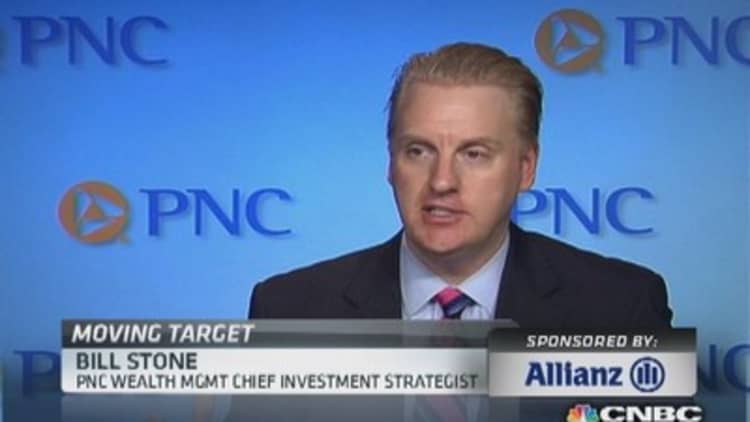With the economy on the rebound and the stock market on a roll, many Americans are feeling better about their financial future.
A new study by Ameriprise Financial found that significantly more people believe they're on track for retirement now than last year. Two in five people surveyed (42 percent) expressed confidence that they are financially prepared, compared with only 37 percent last year.
Findings of the survey of 10,000 adults (ages 40 to 75) in 30 major metropolitan areas included:
- 19 percent said they feel very prepared financially for retirement or the remainder of their retirement.
- 28 percent feel very confident that they will reach their retirement goals or that the remainder of their retirement will work out as planned.
"Feeling confident about retirement is essential, but perhaps not as important as taking steps to financially prepare for that retirement," said Suzanna de Baca, vice president of wealth strategies at Ameriprise Financial.
Some of the numbers from the New Retirement Mindscape report don't seem to justify respondents' optimism, and de Baca warns that it may be unwarranted "and cause a dangerous feeling of complacency."
The survey found that fewer people are taking the steps necessary to save for this milestone as compared with last year.
- While 72 percent said they had done something to prepare for retirement, that number is slightly smaller than in 2011 and 2010.
- Only about half (49 percent) said their retirement balances have recovered from the market downturn in 2008-09.
- Only about one in four (23 percent) has calculated how much he or she will need to save for retirement. That's significantly higher than past years but still dismally low.
"If three-quarters of the people feel they're on track, but only a quarter of them have done any math, then that causes me some concern," said Andrea Singleton, a certified financial planner with Ameriprise in Seattle.
(Read more: How to complain about your bank)
"How do they come to that conclusion?" she asked. "They can't all be planning to win the lottery. They can't all be inheriting large sums of money from mom and dad."

On the bright side, more than half (51 percent) contributed to a 401(k) or other retirement plan—a significant jump from last year's 47 percent.
Health care weighs heavy on people's minds
As people look toward the future, they worry about health-care costs. Nearly half of those surveyed (45 percent) believe medical bills will be one of their most challenging issues after they leave the workforce.
(Read more: Medical identity theft could cost you your life)
They expressed a great deal of concern about the Affordable Care Act. More than half (51 percent) said they worry they'll pay more for health care because of the law. (Keep in mind that this survey was taken in June.)
How much would they need to save to pay for medical costs not covered by Medicare? The median estimate was about $100,000. That's close to what people actually spend, on average, during retirement—$135,500 according to 2012 data from the Employee Benefit Research Institute.
But Ameriprise noted that is significantly less than the $227,000 experts predict will be needed in 2020. And yet few are taking steps to prepare for the bigger bill, and 10 percent said they expect family and friends to care for them if their health begins to fail.
A city-by-city breakdown
Ameriprise combined the results of the study, including people's confidence and financial readiness, in the 30 metro areas surveyed. San Francisco, Detroit and Hartford-New Haven took the top three spots because a higher percentage of residents have taken specific steps—written a financial plan and contributed to a personal retirement account.
(Read more: Here's what debt collectors shouldn't do via text)
In the bottom three locations—Nashville, Los Angeles and Orlando-Daytona Beach-Melbourne—people are saving about as much as the national average, but their confidence level is lower. Ameriprise said that might be a function of housing prices that have not rebounded as well as those in the rest of the country.
Here are the City Pulse index rankings for 2013. The 2012 rank appears in parenthesis.
1. San Francisco-Oakland-San Jose (4)
2. Detroit (17)
3. Hartford-New Haven (1)
4. Minneapolis-St. Paul (3)
5. Seattle-Tacoma (13)
6. San Diego (2)
7. Sacramento-Stockton-Modesto (18)
8. Baltimore (25)
9. St. Louis (15)
10. Phoenix (11)
11. Denver (8)
12. Washington (30)
13. Dallas-Fort Worth (14)
14. Boston (12)
15. Indianapolis (28)
16. Atlanta (10)
17. Tampa-St. Pete (23)
18. Charlotte (29)
19. Portland, Ore. (19)
20. Miami-Fort Lauderdale (20)
21. Chicago (27)
22. Pittsburgh (9)
23. Raleigh-Durham (6)
24. Philadelphia (5)
25. New York (26)
26. Cleveland-Akron (24)
27. Houston (16)
28. Nashville (7)
29. Los Angeles (21)
30. Orlando-Daytona Beach-Melbourne (22)
Don't let fear paralyze you.
Everybody has anxiety about money. That stress can lead to inaction, which only makes things worse. Find someone who will help you take control of your finances. It might feel uncomfortable at first, but in the long run it can reduce stress and get you moving toward your goal.
—By CNBC contributor Herb Weisbaum. Follow him on Facebook and Twitter @TheConsumerman or visit The ConsumerMan website.

